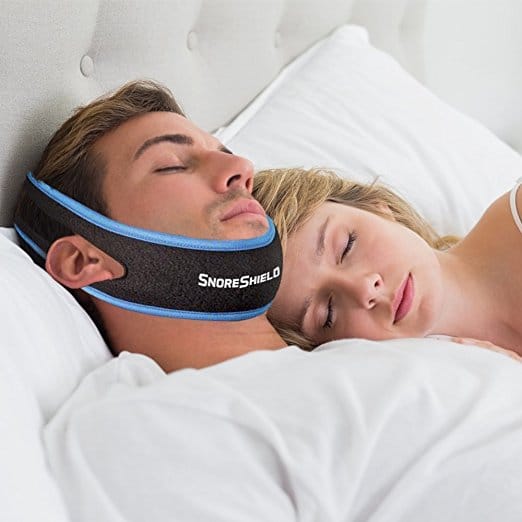
Worried snoring will wake the baby? – What I learned from an informal survey and what you can do
By Jason Wooden, PhD
It’s understandable if you’re worried snoring might wake a baby given how important quality rest is for infants and sleep-deprived parents. We surveyed 27 families and found that snoring was more likely to be an issue for a sleeping spouse than an infant.
To stop snoring from disturbing the sleep of a baby or parent, there’s a wide range of options including anti-snoring sleep aides, oral appliances, and CPAP. There are also simple things you can do to help a baby sleep.
So, you’re wondering whether snoring will wake up a baby?
It’s understandable.
Making sure an infant is getting adequate sleep is important, but let’s not forget that parents of newborns are notoriously sleep-deprived and anything that could lead to less sleep is to be avoided.
Snoring is a common problem caused when air flowing through the mouth or nose becomes obstructed.
Did you know that 40% of adult men and 24% of adult women are habitual snorers?
With numbers like that, there are bound to be parents of newborns who snore.
And it’s not unheard of for a mom to start snoring during pregnancy or after childbirth.
So, how big of an issue is snoring at night for sleeping babies?
Let’s take a look at what we know and what you can do.

How babies sleep and what wakes them up
Before we get into whether snoring actually wakes a sleeping baby, we need to talk a bit about how they sleep and why they wake up.
Sleep needs for infants vary according to age. Newborns need about 10 to 18 hours per day, often sleeping around 8 hours during the night. Because of their tiny stomachs, they often have to wake every few hours to eat.
Around 3 to 4 months, babies start to sleep up to 5 hour stretches.
And by the end of the first year, they may sleep up to 10 hour stretches to the delight of all parents.
So, what can ruin the party?
Besides hunger, there are any number of things that can disturb the peaceful slumber of a baby:
- wet diapers
- changes in temperature
- congestion, coughing, and vomiting
- fever
- teething
- separation anxiety
Unfamiliar sounds may also wake them up which brings us to snoring…

What I learned when we asked parents if snoring woke up their baby
It turns out what snoring does to a baby’s sleep hasn’t been well studied, so we did a quick informal survey of 27 families.
We first asked if the baby slept in the same room as the parents. For over half of them, the baby did sleep in the same space. This included sleeping in the bed, a crib, or a closely attached room.
When asked whether snoring woke the baby, only one parent recalled it being an issue.
So, maybe snoring is not an issue for newborns and infants.
And while unfamiliar sounds have been known to rouse a sleeping infant, perhaps they quickly acclimate to the snoring and it blends into the background noise.
Some parents did report sleep disturbances and complaints from their kids when they were toddlers or older.
And some parents said the baby slept fine, but the snoring disturbed the sleep of a spouse which is just as serious of a problem. Whether it’s baby or snoring spouse wrecking sleep, it’s all the same and can make life harder for sleep deprived parents of a newborn.
Regardless, the results of our informal survey suggest that snoring will not wake the baby and if it does it’s likely not an ongoing problem.
When parents were asked if snoring disturbed the baby, it was more likely to wreck the sleep of a spouse.
When parents were asked if snoring disturbed the baby, it was more likely to wreck the sleep of a spouse.

What to do if you’re worried about snoring waking a baby or spouse
Okay, so what can you realistically do about snoring?
You have a range of options if snoring waking an infant is something you’re really worried about.
Simplest among them is to have the baby or the snorer sleep in a different room.
Likewise, if the baby is sleeping just fine and the real issue is that snoring is killing the sleep of a spouse, a change of rooms might help.
But what can you do if you don’t want to exile a noisy bed mate?
Snoring happens when air flowing through your mouth and nose is obstructed. As you breathe, the tissues in your throat vibrate resulting in that loud and annoying noise.
Depending on your situation, there’s a wide variety of snoring remedies you can try:
1) Ear plugs
May work for a spouse, probably not a good idea for infants due to safety issues
2) White noise
You may try masking the snoring with white noise, but keep in mind the downsides for infants. You can try running a fan or one of these white noise machines.
3) Change your sleep position
Sleeping on your back can cause snoring if the tongue falls backward in the mouth and obstruct your airway. Sleeping on your side may help prevent this. Learn more
4) Avoid alcohol
Alcohol relaxes muscles in the throat which can increase your risk of snoring. You may need to reduce your alcohol consumption and avoid drinking in the evening.
5) Check your meds
Some medications may relax the throat and airway which can make snoring worse. This includes sedatives and muscle relaxants used for other conditions.
6) Nasal obstruction remedies
A cold or allergies can lead to a stuffy nose, obstructed air flow, and snoring. Depending on your situation, a doctor may suggest a hot shower before bed, saline nasal sprays, running a humidifier, decongestants, steroid nasal sprays, nasal strips, or nose vents. Learn more
7) Oral appliances
During sleep, the tongue may relax, fall backward in the mouth, and obstruct airflow. Oral appliances can be worn at night to help keep the airway open. Learn more
8) Chin straps
Breathing through your mouth instead of your nose can cause you to snore while you sleep. Chin straps are a low cost and easy to use solution that works for some people. Learn more
9) Try an anti-snoring pillow
These pillows are designed to prevent snoring by realigning your head and neck so that your throat airways are widened. They may be most effective for mild snoring. Learn more
10) Try CPAP
Habitual snoring can be a sign of an underlying issue such as obstructive sleep apnea, so it’s worth talking to a sleep specialist. They may suggest continuous positive airway pressure (CPAP), a sleep apnea treatment that can also help with snoring. Learn more
11) Weight loss
Did you know that excess body weight has been linked to snoring and sleep apnea? While a diet may not help everyone, it may do the trick if your snoring started after you gained weight. Learn more
12) Surgery
In rare cases, when other snoring treatments fail, surgery may be used to tighten and trim the tissues in the airway. Learn more
Snoring is a serious issue, so it shouldn’t be overlooked. Underlying sleep disorders such as obstructive sleep apnea can wreck sleep and also put you at risk for other life-threatening issues such as heart problems, stroke, and hypertension.
It’s also important to practice good sleep hygiene to get as much regular quality sleep as possible.
That means everyone – mom, dad, and baby – is following healthy sleep habits, avoiding sleep killers such as caffeine and bedroom electronic screens, and maintaining a great sleep environment.

Other things you can do to help the baby sleep
You may be worried that snoring will wake the baby, but by now it should be clear there are many other things more likely to cause problems.
Good news – there’s a lot you can do to help an infant become a better sleeper:
Set a daily schedule – keep consistent naptimes and bedtimes
Establish a bedtime routine – calming activities such as feeding, bathing, cuddling, reading, singing, or quiet music can help get them ready for sleep
Watch the room temperature – experts reccommend keeping the room between 68- and 72-degrees Fahrenheit (20 to 22 degrees Celsius).
Allow them time to settle down – they may fuss or cry before getting more comfortable and falling asleep, so you may need to sooth them
Put them to be bed sleepy, but still awake – this can help them learn to fall asleep on their own
Encourage them to sleep more at night – expose them to light and noise at day, dimmed lights and quiet as bedtime approaches
Smart night time feeding – if your baby wakes up during the night to eat, feed them in a dark and quiet environment
If you are thinking of using white noise to block out household noises, keep in mind the potential downsides including a baby becoming too dependent on it and that not all infants respond well to it.
More useful links to help a baby sleep
Getting Your Baby to Sleep (HealthyChildren.org)
How to Set Good Sleep Patterns for Your Baby (WebMD)
The AAP Finally Admits Bed-Sharing Happens and Offers Tips to Do It Safely (Parents.com)
Baby sleep patterns: An evidence-based guide (Parentingscience.com)
Why Is My Newborn Snoring? (Healthline.com)
Solving Common Toddler Sleep Problems (National Sleep Foundation)
Sources:
1. “Snoring – Overview and Facts”, American Academy of Sleep Medicine website
2. Snoring during pregnancy and its relation to sleepiness and pregnancy outcome – a prospective study. BMC Pregnancy Childbirth. 2014; 14:15.
3. “Snoring, Sleep Apnea and Pregnancy”, 2018, Alaskasleep.com
4. “Newborn Sleep Patterns”, John Hopkins Medicine website
5. “Sleep, Infants and Parents, National Sleep Foundation website
6. “Bedtime habits for infants and children”, Medline Plus website
7. “The Pros and Cons of Using White Noise to Put Babies to Sleep”, Healthline.com
8. Snoring during pregnancy and its relation to sleepiness and pregnancy outcome – a prospective study, BMC Pregnancy Childbirth. 2014; 14:15.
Connect with us:
About Us
Better Sleep Simplified® was founded as a place for you to get clear and well-researched information.
Our goal is to make sure you know about your options so that you take action sooner rather than later.
Check us out on YouTube:
Watch and Learn
Helpful sleep tips, interesting sleep facts and statistics you want to know about
Affiliate Disclosure
This site is a participant in the Amazon Services LLC Associates Program and other affiliate advertising programs designed to provide a means for sites to earn advertising fees by advertising and linking to them.
Important: BetterSleepSimplified.com is for informational purposes only and is not intended or implied to be a substitute for professional medical advice, diagnosis, or treatment. Always consult a physician for sleep and health concerns. See additional information.
